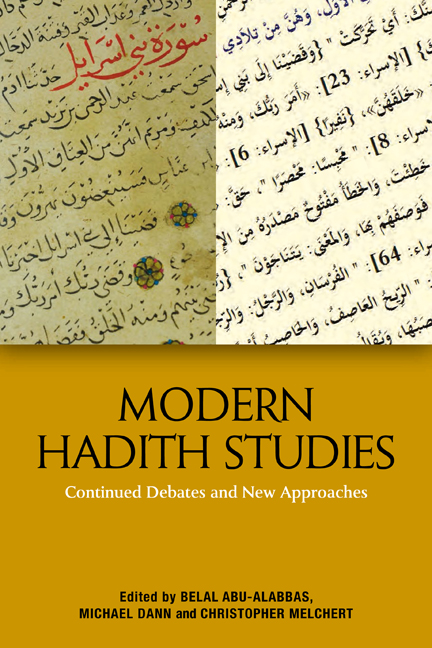Book contents
- Frontmatter
- Contents
- Figures and Tables
- Acknowledgements
- Note on Conventions
- Notes on Contributors
- Introduction
- 1 Kunnā nakrahu al-kitāb: Scripture, Transmission of Knowledge, and Politics in the Second Century AH (719–816 ce)
- 2 The History of the Adhān: a View from the Hadith Literature
- 3 Ibn al-Mubārak, Traditionist
- 4 Early ‘Traditionist Sufis’: A Network Analysis
- 5 The Common Link and its Relation to Hadith Terminology
- 6 Hadith Criticism between Traditionists and Jurisprudents
- 7 Hadith Criticism in the Levant in the Twentieth Century: From ẓāhir al-isnād to ʿilal al-ḥadīth
- 8 The Reception and Representation of Western Hadith Studies in Turkish Academe
- 9 Can Different Questions Yield the Same Answers? Islamic and Western Scholarship on Shiʿi Narrators in the Sunni Tradition
- Index
Introduction
Published online by Cambridge University Press: 01 October 2020
- Frontmatter
- Contents
- Figures and Tables
- Acknowledgements
- Note on Conventions
- Notes on Contributors
- Introduction
- 1 Kunnā nakrahu al-kitāb: Scripture, Transmission of Knowledge, and Politics in the Second Century AH (719–816 ce)
- 2 The History of the Adhān: a View from the Hadith Literature
- 3 Ibn al-Mubārak, Traditionist
- 4 Early ‘Traditionist Sufis’: A Network Analysis
- 5 The Common Link and its Relation to Hadith Terminology
- 6 Hadith Criticism between Traditionists and Jurisprudents
- 7 Hadith Criticism in the Levant in the Twentieth Century: From ẓāhir al-isnād to ʿilal al-ḥadīth
- 8 The Reception and Representation of Western Hadith Studies in Turkish Academe
- 9 Can Different Questions Yield the Same Answers? Islamic and Western Scholarship on Shiʿi Narrators in the Sunni Tradition
- Index
Summary
‘Ḥadīth’ means ‘speech’ in Arabic. Technically, it indicates a report or a body of reports (the Arabic word is used both ways, although there is also a plural, aḥādīth) of what the Prophet or some other authoritative teacher said. From hadith, Muslim jurisprudents infer the Sunnah, the pattern of behaviour that Muslims should follow. A hadith report normally comes in two parts, the matn (‘main part’), which is what the Prophet or other authority said, and the isnād (‘support’), the chain of authorities by which it has reached the present collector. The isnād is one's proof that this report was not made up somewhere along the way and projected backward onto a venerable authority of the past. In time, writers distinguished between ḥadīth going back to the Prophet and āthār (sing. athar) going back to other early Muslims, but the terms were interchangeable in the early centuries. (Hadith reports were once called ‘traditions’ in European languages, by analogy with preliterary oral reports of what Jesus said. ‘Hadith’ is now in standard English dictionaries, but ‘traditionist’ may still be used for someone who collects hadith.)
Here is an example of a hadith report going back to the Prophet:
There related to us ʿUbayd Allāh ibn Mūsá: there reported to us Ḥanẓalah from Sālim from Ibn ʿUmar from the Prophet: he said, ‘It is better for one of you to have his insides filled with pus than with poetry.‘
Here is another (henceforward, ‘there related to us’, ‘from’, and so on will be abbreviated by a simple sign):
Abū al-Walīd al-Ṭayālisī < Shuʿbah < al-Aʿmash < Abū Ṣāliḥ < Abū Hurayrah < the Messenger of God: ‘It is better for one of you to have his insides filled with pus than with poetry.‘
The above are from two of the most trusted Sunni collections of hadith. Here is one from a collection of weak hadith:
Muḥammad ibn al-Ḥasan al-Baṣrī < ʿAlī ibn Baḥr < ʿĪsá ibn Yūnus < al-Aḥwaṣ ibn al-Ḥakīm < Khālid ibn Maʿdān < Abū al-Dardāʾ < the Messenger of God: ‘It is better for one of you to have his insides filled with pus and blood than with poetry.’
- Type
- Chapter
- Information
- Modern Hadith StudiesContinuing Debates and New Approaches, pp. 1 - 8Publisher: Edinburgh University PressPrint publication year: 2020



